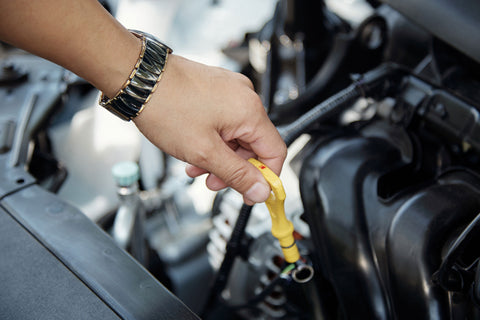Groomed and waxed through the winter - when autumn, frost and snow are lurking, it's time to winterize the camper. The whole thing could also be called “anticipatory camping”, because this way you not only guarantee that you will get through the cooler season without frustration, but also make the start of the next season easier for you. Before any seasonal storage, you should check your caravan or mobile home carefully and also service some (add-on) components.
1. Clean up!
End the camping season with a thorough wash of your vehicle with the right cleaning product. A clean vehicle is not only visually more attractive, it also prevents dirt and encrustations. This helps to minimize the risk of rusting and ensures the smooth functioning of moving parts.For cleaning the outside of your camping vehicle, it is best to use a car wash that is equipped with uncovered washing areas, or where the canopy is high enough for your mobile home or caravan to fit underneath. Check carefully in advance whether the height of your vehicle corresponds to the dimensions shown!
With a high-pressure lance and foam brush, you can free your camper from last season's dirt. We recommend that you do not get too close to the vehicle with the high-pressure cleaner. You should avoid using the high-pressure lance, especially in the area of windows and other openings. The enormous water pressure can cause leaks or unsightly damage to the paintwork. You should remove particularly stubborn dirt with a suitable sponge or cloth. Rain streaks can often only be removed without leaving any residue with a strong cleaning agent.

Caution window!
You must not clean the acrylic glass of hinged windows , side windows or skylights with conventional glass cleaner. As a result, they can become cloudy or even tear. Use a special acrylic cleaner instead. This is because acrylic glass consists of more plastic than glass.
2. Open your eyes and get to it!
We recommend that you carry out a visual inspection and functional test of your vehicle before or after cleaning. Take the time to look closely at your camper. This allows you to quickly assess the condition and, if you wish, make a list of upcoming repair work or maintenance processes. To do this, walk slowly around the vehicle and take a close look at everything.
What do you see?
- Can damage be seen?
- Are lights and reflectors undamaged?
- Are the paint or stickers coming off?
- Are the rearview mirrors okay?
Also, open & close all windows once to check whether the seals are still in place and the pane slides cleanly through in both directions.
You should also check the technical condition for the winter break. A second person should assist you for a light check. Check together whether all the lights are working and also check the reflector (e.g. by shining a flashlight on it).
Since you have to start the engine for the light test in mobile homes, pay attention to the indicator lights in the cockpit. These show you any faults or malfunctions in the base vehicle.
The following applies to caravan owners: Couple the caravan to the towing vehicle and make sure that the towing tube can be pushed in and out without restriction. Always check whether the ball head of the coupling is clean and closes properly.
More maintenance tips:
- Check engine oil and brake fluid levels
- top up the washer fluid (including antifreeze if necessary).
- check the condition of the wipers
- check the wear indicator of the anti-roll system

When to the workshop?
You should not carry out some work on your camping vehicle yourself. It is best to have repairs to the brake system carried out by a specialist workshop. Because if you make mistakes during repairs, they can lead to life-threatening accidents. If it turns out after an accident that you worked on the brake system yourself, the insurance company does not have to pay for the damage and that can quickly pose a financial challenge, as you actually rely on being covered.
It is also best to have work on the underbody done in a specialist workshop. This is mainly due to practical reasons, because some areas of the underbody cannot be reached without a lifting platform or workshop pit.
4. Water hygiene
Habitat water, but please not like this: At the beginning of the next season, the water system should not show any life in the form of fungi and/or bacteria. Before you empty the fresh water tank with drinking water, you should treat the entire water system with a suitable cleaning agent. You should fill the water system several times so that the hoses and boiler are sufficiently rinsed. And if you are interested in new life forms, you can use the winter break to breed and study microscopic creatures... just an idea. 😉
5. Paperwork
Be alert in time. Before you end the camping season, you should take a look at the vehicle documents. Are these still complete and in their intended place? When is the next appointment at the TÜV? Is the driving license still valid? Also pay attention to the entry of the individual driver's license classes. For truck classes C1 and C, the deadlines may differ from the car driver's license. You can take care of any upcoming extensions during the winter break, which also increases your anticipation for the coming season a little bit.
The pre-winter check is a clear recommendation to all of us. It is a well-known fact that those who look after and cherish their things enjoy everything for longer. And every defect that you repair before the season will no longer bother you on vacation. You will find many of the things that need to be refilled or repaired in our range. And if you can't find something, just ask. Together we will find something suitable for you...

Image credits: Unsplash, Pixabay, freepik





